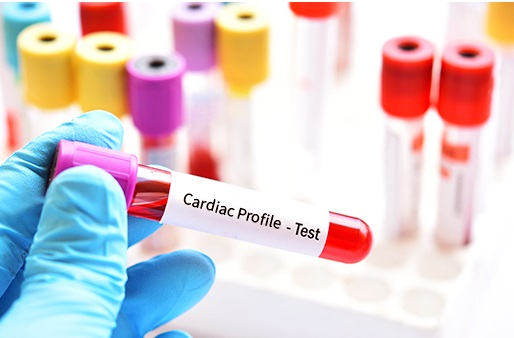Nikhil Prasad Fact checked by:Thailand Medical News Team Jan 09, 2025 1 year, 3 weeks, 6 days, 21 hours, 37 minutes ago
Medical News: Acute myocardial infarction (MI), commonly known as a heart attack, remains a pressing global health issue despite advances in modern medicine. Affecting millions each year, it poses a significant risk of mortality and long-term health complications. While life-saving treatments have improved survival rates, many survivors face subsequent complications, including heart failure, recurrent heart attacks, and arrhythmias. To tackle this issue, scientists from institutions in Italy, Greece, and beyond are investigating biomarkers - biological indicators that can help monitor heart health and predict complications post-MI. This
Medical News report dives into the findings of a recent study, which highlights the promise of novel and traditional biomarkers in revolutionizing cardiac care.
 Biomarkers for Heart Health Monitoring After Myocardial Infarction
Biomarkers for Heart Health Monitoring After Myocardial Infarction
The study, published by researchers from the University of Trieste, University of Udine, University of Milan, and Heraklion University General Hospital, reviews the role of various biomarkers in detecting and managing heart conditions after MI. Researchers emphasize the importance of early and precise monitoring to prevent complications. The field of biomarkers has expanded rapidly, and these tools now offer insights into myocardial stress, inflammation, and heart tissue remodeling.
The Role of Biomarkers in Post-MI Care
Biomarkers are specific molecules in the body that provide critical information about biological processes. These molecules can indicate stress on heart muscles, inflammation levels, and other cardiovascular risks. In post-MI scenarios, their role is pivotal in tracking recovery and preventing further complications.
For years, traditional markers such as natriuretic peptides and troponins have served as the mainstay of cardiac monitoring. However, as this article discusses, emerging biomarkers such as adrenomedullin, growth differentiation factor-15 (GDF-15), and insulin-like growth factor binding protein 7 (IGFBP7) are now paving the way for a more comprehensive approach to heart health.
Key Study Findings
The researchers examined a range of biomarkers, categorizing them by their role in different biological processes, including myocardial stress, cardiac muscle damage, inflammation, and extracellular matrix remodeling. Here are some highlights:
1.Myocardial Stress and Stretch
-Natriuretic Peptides (BNP and NT-proBNP): These hormones, released in response to heart muscle stretch, remain gold standards for diagnosing heart failure. Elevated levels post-MI are linked to adverse remodeling and a higher risk of complications.
-Soluble Suppression of Tumorigenicity 2 (sST2): Released during heart muscle strain, sST2 inhibits protective processes that prevent fibrosis and hypertrophy. Elevated levels post-MI indicate early remodeling and stress.
-Adrenomedullin (ADM): This hormone plays a p
rotective role in maintaining vascular health. Research suggests that ADM’s diagnostic capabilities could surpass traditional markers in some cases, offering a clearer picture of heart health.
2. Cardiomyocyte Death
-Troponins: These proteins, released during heart muscle cell death, are critical for diagnosing MI. High-sensitivity assays for cardiac troponins now allow early detection of ongoing myocardial injury.
3. Inflammation
-C-reactive Protein (CRP): Elevated levels of this inflammatory marker are common post-MI. High-sensitivity CRP assays reveal that even low levels carry significant prognostic information.
-Interleukins (IL-1, IL-6): While still investigational, these cytokines show potential for monitoring chronic inflammation linked to heart failure.
4. Extracellular Matrix Remodeling and Fibrosis
-Galectin-3 (Gal-3): Associated with fibrosis and inflammation, Gal-3 has shown promise in predicting heart failure progression.
-Collagen Turnover Markers: These include fragments of Type I collagen, which provide insights into the breakdown and formation of cardiac tissue.
5. Emerging Biomarkers
- Vitamin D: Low levels are linked to poor cardiovascular outcomes, as vitamin D helps regulate inflammation and oxidative stress.
-
Amyloid Beta 1-40 (Aβ1-40): Known for its role in Alzheimer’s disease, this molecule is gaining attention in cardiovascular research due to its involvement in plaque formation and arterial stiffness.
-Trimethylamine N-Oxide (TMAO): Derived from dietary sources like red meat, TMAO levels correlate with cardiovascular risks and adverse outcomes post-MI.
-Advanced Glycation End Products (AGEs): Formed from sugar-protein interactions, AGEs contribute to vascular stiffening and inflammation.
Implications for Clinical Practice
The study highlights the critical need for integrating biomarkers into routine post-MI care. By monitoring these indicators, clinicians can tailor treatments to individual patients, reducing the risk of complications and improving outcomes. For instance:
-High BNP or NT-proBNP levels could prompt intensified heart failure therapies.
-Elevated CRP levels might guide anti-inflammatory interventions.
-TMAO monitoring could lead to dietary modifications for at-risk individuals.
Conclusions and Future Directions
The findings of this study underline the transformative potential of biomarkers in managing heart health after myocardial infarction. Biomarkers not only enable early detection of complications but also offer a window into the biological processes underlying heart disease. This knowledge equips clinicians with the tools to make informed decisions and optimize patient care.
Looking ahead, further research is essential to validate emerging biomarkers like Aβ1-40 and AGEs. Large-scale studies are needed to establish clinical guidelines and cut-off values for these indicators. Additionally, efforts to improve patient adherence to post-MI protocols, including cardiac rehabilitation programs, remain a priority.
In conclusion, biomarkers represent a beacon of hope in the fight against cardiovascular disease. Their integration into clinical practice promises to improve outcomes for millions of MI survivors worldwide.
The study findings were published in the peer-reviewed Journal of Clinical Medicine.
https://www.mdpi.com/2077-0383/14/1/129
For the latest on Heart Health, keep on logging to Thailand
Medical News.
Read Also:
https://www.thailandmedical.news/news/exploring-drug-induced-myocardial-infarction
https://www.thailandmedical.news/news/prolonged-sitting-increases-risk-of-heart-disease-even-for-those-that-exercise
